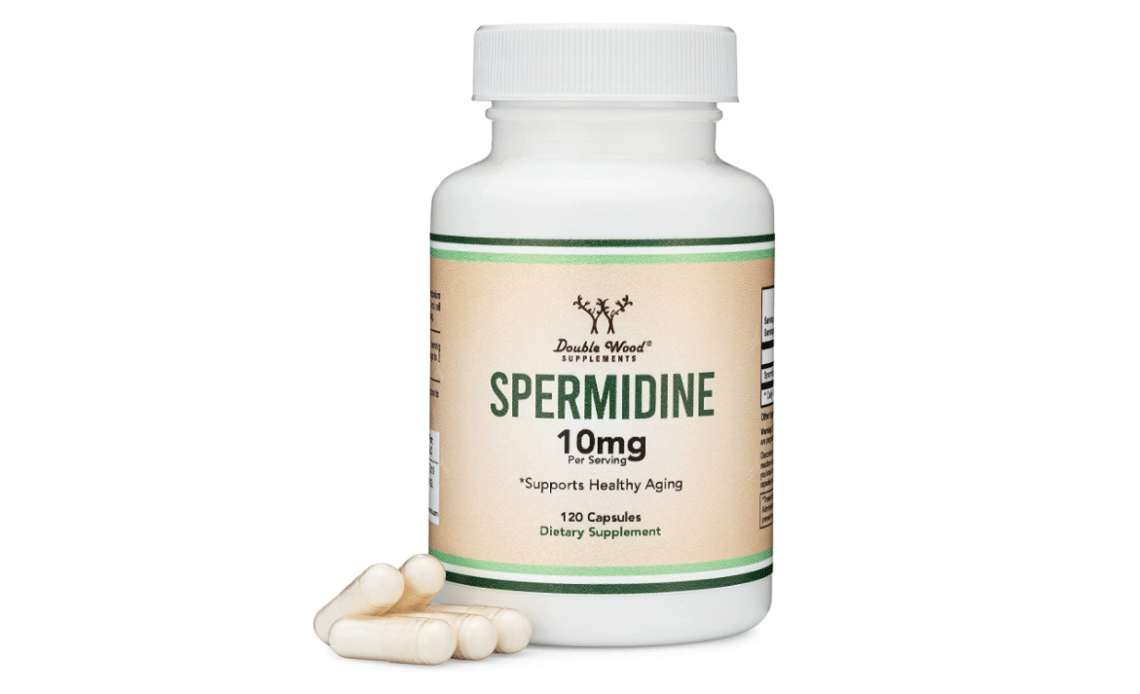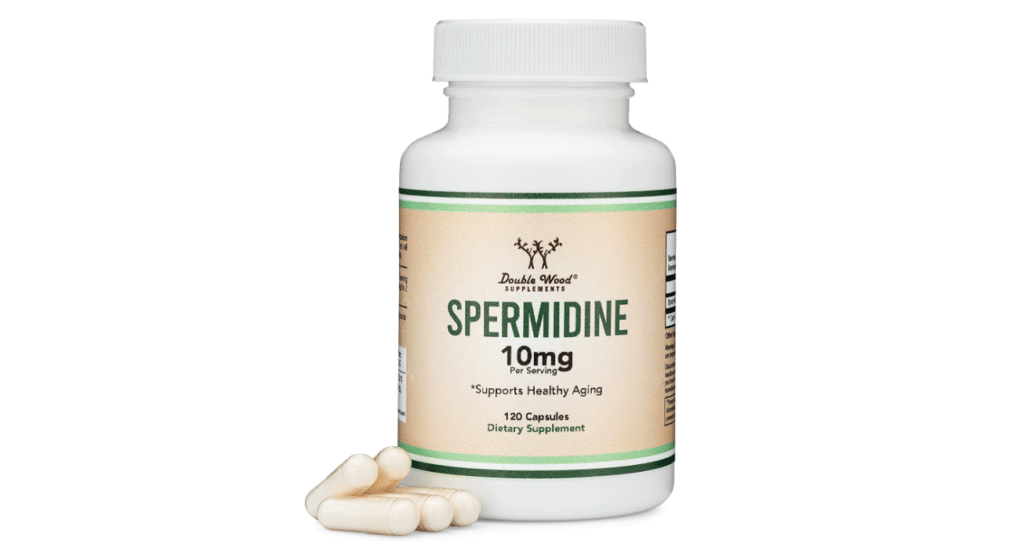
Spermidine is a naturally occurring polyamine compound that has been gaining attention for its potential health and longevity benefits. As we age, spermidine levels in the body tend to decline, which may contribute to age-related health issues. Supplementing with spermidine may help maintain youthful levels in the body and promote overall wellbeing.
What is Spermidine?
Spermidine is a polyamine compound that was first isolated and identified in 1678 by Dutch scientist Anton van Leeuwenhoek. He discovered spermidine in human semen and other bodily fluids.
Polyamines like spermidine contain organic compounds with more than two amino groups in their chemical structure. Spermidine is synthesized in the body from putrescine and spermine, two other polyamine compounds.
In most living organisms’ cells, spermidine plays several crucial physiological roles. It promotes cell growth and division, regulates gene transcription and expression, and initiates programmed cell death (apoptosis). Spermidine also helps maintain the integrity of DNA and is involved in cell signaling pathways.
One of spermidine’s most essential functions is activating autophagy. Cells use this regulated process to break down unnecessary or dysfunctional components. Autophagy generates energy while recycling nutrients and clearing out damage within the cell. Spermidine helps maintain autophagy pathways to promote normal cellular health and longevity.
Through these complex cellular interactions, spermidine is an essential growth factor and signaling molecule throughout the body. It allows for proper tissue development, neurological function, immune response, and more. Optimizing spermidine levels supports overall well-being.

Best Spermidine Capsules
Double Wood Supplements Spermidine
Looking for the most convenient way to take spermidine? Try these capsules from Double Wood Supplement.
Where is Spermidine Found?
In mammals, spermidine is present in all cells but in higher concentrations in specific tissues. The organs with the most spermidine include the brain, kidneys, liver, and reproductive glands.
Within cells, spermidine is most abundant in the nucleus, where it interacts with DNA and is involved in gene regulation and expression. It also concentrates in the cytoplasm to regulate autophagy and apoptosis pathways.
Dietary sources provide an additional means of obtaining spermidine. Foods highest in spermidine include:
- Soybean products like natto, miso, soy sauce, and tempeh
- Wheat germ
- Mushrooms
- Aged cheeses such as cheddar, Parmesan, and Gruyère
- Various meats and poultry
- Broccoli, cauliflower, cabbage and other cruciferous vegetables
- Avocados, apples, citrus fruits
- Peanuts, pistachios, walnuts
Natto, a fermented soybean dish popular in Japan, has exceptionally high amounts containing over 100 mg of spermidine per 100g serving. Wheat germ, certain mushrooms, and some cheeses also provide relatively high quantities.
However, the concentration of polyamines in food can vary greatly depending on ripening, processing, and storage conditions. As a result, dietary intake from whole foods tends to be substantially lower and less reliable than pharmaceutical-grade spermidine supplements.
Maintaining adequate spermidine levels from a variety of sources can help maximize its health-protective effects throughout the body.
Spermidine Levels Decline with Age
Several studies show that as humans age, physiological levels of polyamines like spermidine significantly decrease over time.
In healthy adults, blood plasma concentrations of spermidine remain relatively stable until around age 30. Beyond this point, levels progressively decline at approximately 10% per decade.
By age 60, the average person has roughly half the spermidine concentrations compared to age 20. Levels continue to decrease into later life.
This age-related reduction in systemic spermidine correlates with a drop in autophagy activity in cells throughout the body. As autophagy declines with age, cellular cleanup and renewal processes also slow. This allows damage to accumulate and contributes to functional deterioration.
Lower spermidine status is also associated with an increased risk of age-related health conditions like heart disease, neurodegeneration, cancer, impaired immunity, infertility, etc.
Consuming spermidine-rich foods or targeted supplements can help sustain youthful levels in the body. Maintaining higher systemic concentrations may counteract natural decline and preserve cellular autophagy and protective effects.
Optimizing spermidine intake over the lifespan through diet and/or supplementation may promote longevity, healthy aging, and an extended health span. More human research is underway to validate these potential anti-aging benefits further.
Mechanisms of Action
Research has uncovered several key mechanisms that help explain how spermidine exerts its broad health and longevity effects at the molecular and cellular level:
Activates Autophagy
Multiple studies have shown spermidine is a potent inducer of cell autophagy. It stimulates autophagy by directly inhibiting acetyltransferase enzymes EP300 and CREB-binding protein (CBP).
Acetyltransferase inhibition leads to hypoacetylation of histone and nonhistone proteins involved in autophagy regulation, including Atg5, Atg7, and Atg8. This increases their affinity for chromatin and enhances autophagy activation (3).
Spermidine-induced autophagy provides homeostatic, cytoprotective, and anti-aging effects throughout the body.
Epigenetic Regulation
As a polycationic compound, spermidine can interact directly with DNA and regulate gene expression through epigenetic mechanisms.
By altering chromatin structure and modifying histones, spermidine controls access of transcriptional machinery to DNA. This modulates signaling pathways related to cell proliferation, survival, metabolism, and more.
Anti-Inflammatory Activity
In animal and human studies, Spermidine administration has been found to reduce systemic inflammatory markers like IL-6, TNF-α, and C-reactive protein.
Proposed mechanisms for these anti-inflammatory effects include inhibition of NF-κB activity, regulation of macrophage and neutrophil function, and optimized cytokine production.
Antioxidant Effects
In addition to modulating endogenous antioxidants like glutathione, spermidine is able to directly scavenge reactive oxygen species and other free radicals.
This antioxidant activity protects against oxidative damage to lipids, proteins, and DNA within cells. It reduces oxidative stress implicated in aging, neurodegeneration, cardiovascular disease, and other conditions.
Mitochondrial Protection
By stimulating autophagic pathways, spermidine enhances the clearance of old and dysfunctional mitochondria from cells through mitophagy.
This grows new healthy mitochondria and restores youthful mitochondrial activity and ATP production. The improved mitochondrial function and energy metabolism benefits tissues throughout the body.
Key Benefits of Spermidine
Promotes Longevity – Spermidine has been shown in multiple animal studies to increase lifespan by 10-30%. The longevity effects are believed to be through spermidine’s ability to activate autophagy pathways and other protective mechanisms in cells and tissues. Autophagy is the process of cellular renewal that declines with age. By maintaining youthful autophagy rates, spermidine supports longevity at the cellular level.
Supports Heart Health – Human studies link increased dietary spermidine with lower risks of hypertension and cardiovascular disease. Spermidine is thought to help maintain healthy blood pressure levels by regulating arginine metabolism and nitric oxide production. It also appears to support healthy cholesterol profiles and endothelial function. These effects may help reduce atherosclerosis and related cardiovascular conditions.
Protects Brain Function – Spermidine has been shown in animal models to prevent aging-related cognitive decline and memory loss. It appears to have neuroprotective qualities that guard neurons against damage from oxidative stress, inflammation, and other stressors. By stimulating autophagy in the brain, spermidine can prevent protein buildup and cell death associated with neurodegenerative disorders like Alzheimer’s and Parkinson’s. More human research is needed, but these preliminary findings are promising.
Prevents Cancer – In cell studies, spermidine has been found to induce regulated cell death (apoptosis) in specific cancerous cells while having protective effects on normal healthy cells. It may also counteract some common side effects of chemotherapy, like hair loss and digestive issues. While human clinical evidence is still limited, optimizing spermidine status shows potential for cancer prevention and improved cancer treatment outcomes.
Boosts Immunity – Spermidine acts as an immune-regulating compound in many cell types involved in immune response. It enhances the activities of T-cells, B-cells, macrophages, and more through epigenetic effects and by stimulating autophagy. Restoring age-related decline in autophagy by supplementing with spermidine has been shown to rejuvenate immune cell function. This may translate to improved vaccine responses and protection against viruses like COVID-19 in older adults.
Enhances Male Fertility – Multiple human studies indicate that increasing dietary spermidine intake can improve sperm motility, count, and overall reproductive fertility in men. It appears to support proper testosterone levels while normalizing elevated estrogen levels linked to impaired fertility. Spermidine supplements have also been shown to reduce oxidative damage to sperm cells caused by reactive oxygen species. Maintaining sufficient spermidine levels helps sustain optimal male reproductive function.
Anti-aging – The combination of spermidine’s longevity, brain, immune, and metabolic benefits result in systemic anti-aging effects. It can reverse or delay age-related functional decline in tissues throughout the body. Oral and topical applications of spermidine have been shown to promote more youthful skin, hair growth, and nail strength. Optimizing spermidine status helps maintain youthfulness internally and externally.
Increases Cellular Energy – By stimulating autophagy, spermidine can remove old, dysfunctional mitochondria from cells. This allows for new and more active mitochondria to grow, enhancing cellular energy production, ATP levels, and overall metabolism. Many tissues, including the brain, muscles, heart, and immune cells can feel the energy-boosting effects.
Maintaining optimal spermidine intake can have systemic benefits for longevity, healthspan, disease prevention, and quality of life as part of a healthy lifestyle.

Best Spermidine Capsules
Double Wood Supplements Spermidine
Looking for the most convenient way to take spermidine? Try these capsules from Double Wood Supplement.
Spermidine, COVID-19 and Immunity
Emerging research suggests spermidine supplements may help strengthen immune function and improve vaccine effectiveness, especially in older adults.
As we age, autophagy activity declines in immune cells like T and B cells. This impairs the body’s ability to mount robust immune responses. Older adults tend to have weaker vaccine reactions compared to younger people.
Spermidine is capable of reactivating autophagy pathways in aged immune cells. Multiple studies show it can restore T cell proliferative capacity and cytokine production in older adults to more youthful levels.
Researchers have also found spermidine pretreatment enhances influenza vaccine immunogenicity in animal models. Mice receiving spermidine before vaccination had stronger antibody production and greater protection against the flu compared to unsupplemented mice.
Though direct evidence in humans is still limited, these findings suggest spermidine supplementation may improve COVID-19 and other viral vaccine responses in older populations. Rejuvenating immune cell function could provide greater protection against SARS-CoV-2 and seasonal influenza viruses.
More clinical trials are underway to validate spermidine’s immune-enhancing, antiviral effects. But current research indicates optimizing spermidine intake, especially in those over 60, could be an effective supportive strategy for bolstering immunity during viral pandemics.
Spermidine Safety & Side Effects
Spermidine is considered safe for human consumption when obtained from food sources and taken at suggested supplemental dosages.
Oral doses of up to 200 mg per day have been well tolerated in clinical studies, with few reports of adverse reactions. It has a wide therapeutic index, meaning the effective dose is far below toxic levels.
The most common side effect is transient digestive upset, including nausea, diarrhea, or constipation. This is often mild and tends to resolve quickly with continued use.
Rarely, spermidine may interact with antipsychotic drugs like haloperidol, causing increased sedation. Those on antipsychotic medications should consult a doctor before using spermidine supplements.
There are no known contraindications or long-term safety concerns with spermidine supplementation. It does not appear mutagenic or carcinogenic according to current toxicology data.
Spermidine exhibits an excellent safety profile and is considered a non-toxic nutritional compound. Maintaining adequate intake through foods and/or supplements is well tolerated and can significantly benefit healthspan and longevity.
The Takeaway
- Spermidine is a polyamine compound that plays a vital role in cell growth and survival.
- Levels of spermidine decline with normal aging, which can contribute to age-related health decline.
- Research shows spermidine promotes longevity, heart health, brain function, immunity and more when levels are optimized.
- Food-based supplements are an effective way to increase spermidine status compared to dietary sources alone.
- Spermidine is safe and well-tolerated by most people, with minimal risk of side effects.
- Maintaining sufficient spermidine intake can be an important part of supporting overall wellness as we age.
Spermidine is an emerging anti-aging nutrient with systemic benefits for longevity and disease prevention. Including spermidine-rich foods or supplements as part of a healthy lifestyle is a science-backed strategy for healthy aging.